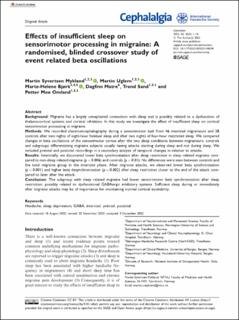Effects of insufficient sleep on sensorimotor processing in migraine. A randomised, blinded crossover study of event related beta oscillations
Mykland, Martin Syvertsen; Uglem, Martin; Bjørk, Marte-Helene; Matre, Dagfinn; Sand, Trond Halfdan; Omland, Petter Moe
Peer reviewed, Journal article
Published version

Åpne
Permanent lenke
https://hdl.handle.net/11250/3065114Utgivelsesdato
2023Metadata
Vis full innførselSamlinger
Originalversjon
10.1177/03331024221148398Sammendrag
Background Migraine has a largely unexplained connection with sleep and is possibly related to a dysfunction of thalamocortical systems and cortical inhibition. In this study we investigate the effect of insufficient sleep on cortical sensorimotor processing in migraine. Methods We recorded electroencephalography during a sensorimotor task from 46 interictal migraineurs and 28 controls after two nights of eight-hour habitual sleep and after two nights of four-hour restricted sleep. We compared changes in beta oscillations of the sensorimotor cortex after the two sleep conditions between migraineurs, controls and subgroups differentiating migraine subjects usually having attacks starting during sleep and not during sleep. We included preictal and postictal recordings in a secondary analysis of temporal changes in relation to attacks. Results Interictally, we discovered lower beta synchronisation after sleep restriction in sleep related migraine compared to non-sleep related migraine (p=0.006) and controls (p=0.01). No differences were seen between controls and the total migraine group in the interictal phase. After migraine attacks, we observed lower beta synchronisation (p<0.001) and higher beta desynchronisation (p=0.002) after sleep restriction closer to the end of the attack compared to later after the attack. Conclusion The subgroup with sleep related migraine had lower sensorimotor beta synchronisation after sleep restriction, possibly related to dysfunctional GABAergic inhibitory systems. Sufficient sleep during or immediately after migraine attacks may be of importance for maintaining normal cortical excitability.